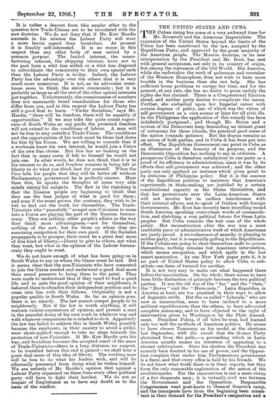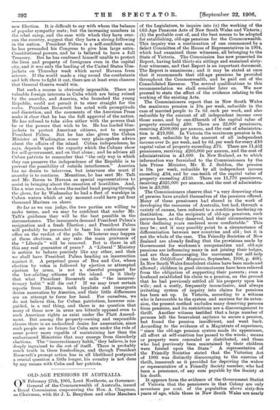THE UNITED STATES AND CUBA. T HE Cuban rising has come
at a very awkward time for Mr. Roosevelt and the American Imperialists. The expansion of the United States beyond the limits of the Union has been sanctioned, by the law, accepted by the Republican Party, and approved by the great majority of the American people. The Monroe doctrine, in its new interpretation by the President and Mr. Root, has met with general acceptance, not only in its country of origin, but among the statesmen of the Old World. But America, while she undertakes the work of policeman and caretaker of the Western Hemisphere, does not wish to have more trouble in the business than she can help. She has sufficient home problems to occupy her time, and for the present, at any rate, she has no desire to press unduly the rights she has claimed. There is a Congressional Election ahead, and neither party desires to complicate the issues. Further, she embarked upon her Imperial career with certain dogmas of policy, one of which was the virtue of self-government as a cure sooner or later for all civic ills. In the Philippines the application of this remedy has been indefinitely postponed ; and though Mr. Bryan and a section of the Democrats keep demanding an instant grant of autonomy for these islands, the practical good sense of the nation counsels patience. But the dogma remains as an axiom of both parties, and in Cuba it has been put into effect. The Republican Government can point to Cuba as an illustration of the honesty of its purpose, and the Democratic Opposition has nothing to say in criticism. A prosperous Cuba is therefore satisfactory to one party as a proof of its efficiency in administration, since it was by its efforts that self-government was achieved ; and the other party can only applaud an instance which gives point to its criticism of Philippine policy. But it is the essence of the Republican position to maintain that America's experiments in State-making are justified by a certain constitutional capacity in the States themselves, and that her protectorate over the Latin-American States will not involve her in endless interference with their internal affairs, not to speak of friction with foreign Governments. Mr. Root has recently been travelling round South America, speaking everywhere words of commenda- tion, and sketching a rosy political future for these Latin peoples. But Cuba remains the test case of the whole policy. Her reconstruction after the war was a most creditable piece of administrative work of which Americans are justly proud. A recrudescence of anarchy is pleasing to neither party, but it is especially galling to the Republicans. If the Cubans are going to show themselves unfit to govern themselves, nothing remains but American intervention, which means occupation, and which spells in the last resort annexation. As one New York paper puts it, it is no part of United States policy to allow Cuba to sub- stitute one form of turmoil for another.
It is not very easy to make out what happened there before the insurrection. On the whole, there seems to have been little distinction of principle between the two political parties. It was the old war of the " Ins " and the "Outs," the " Haves " and the "Have-nots." Latin Republics, in America at least, are too practical in their ways to allow of dogmatic strife. But the so-called "Liberals," who are now in insurrection, seem to have inclined to a more militant republicanism than the others, to have advocated complete autonomy, and to have objected to the right of intervention given to Washington by the Platt Amend- ment. President Palma, if all tales be true, had learned only too well the methods of American politics. He seems to have chosen Tammany as his model at the elections last September, with the result that the Gomez Party abstained from the polls,—a proceeding which in Latin America usually means an intention of appealing to a sterner arbitrament. Since his election the President has scarcely been discreet in his use of power, and the Opposi- tion complain that under him Parliamentary government is a farce, and that every office is held by his friends. We do not know what truth there is in these reports, but they form the only reasonable explanation of the action of the revolutionaries. For the insurrection is not a mere rising of a few desperate men ; it is virtually civil war between the Government and the Opposition. Responsible Congressmen :went post-haste to General Guerra's camp, and the insurgents have from the beginning been consis- tent in their demand for the President's resignation and a new Election. It is difficult to say with whom the balance of popular sympathy rests ; but the increasing numbers in the rebel camp, and the ease with which they have over- run the country, suggest that they have a strong following in the nation. President Palma is a self-confident man, be has persuaded his Congress to give him large extra- Constitutional powers, and he is believed to have a full Treasury. But he has confessed himself unable to protect the lives and property of foreigners even in the capital city, and it was only the landing of the United States blue- jackets on Thursday week which saved Havana from seizure. If the world made a ring round the combatants and left them to fight it out, there are at least even chances that General Guerra would win.
But such a course is obviously impossible. There are valuable foreign interests in Cuba which are being ruined by the anarchy, and America, who launched the young Republic, could not permit it to steer straight for the rocks. President Roosevelt has acted with promptitude and discretion, and the comments of the American Press make it clear that he has the full approval of the nation. He has refused. to take sides either with the powers that be or the powers that wish to be. He has landed blue- jackets to protect American citizens, not to support President Palma. But he has also given the Cuban Minister at Washington some very plain-spoken advice about the affairs of the island. Cuban independence, he says, depends upon the capacity which the Cubans show for self-government, and on that alone ; and he advises all Cuban patriots to remember that "the only way in which they can preserve the independence of the Republic is to prevent the possibility of outside interference. America has no desire to intervene, but intervene she must if anarchy is to continue. Meantime, he has sent Mr. Taft and Mr. Bacon to Havana as special representatives to assist in bringing about the cessation of hostilities. And, like a wise man, he shows the mailed hand peeping through the glove, for by Wednesday he had a fleet of warships in Cuban waters which at any moment could have put four thousand Marines on shore.
So far as we can judge, the two parties are willing to make terms, and we may be confident that under Mr. Taft's guidance they will be the best possible in the circumstances. The insurgents demand President Palma's resignation and. a fresh Election ; and. President Palma will probably be persuaded to base his continuance in office on the verdict of the polls. Whatever may happen at these elections, at any rate the main grievance of the " Liberals " will be removed. But is there in all this any real guarantee of peace ? A "Liberal" Ministry is certain to behave precisely like any other, and. then we shall have President Palma heading an insurrection against it. A perpetual game of Box and Cox, where election by votes is followed by ejection or attempted ejection by arms, is not a cheerful prospect for the law-abiding citizens of the island. Is it likely that what President Roosevelt calls "the insurrec- tionary habit" will die out ? If we may trust certain reports from Havana, both loyalists and insurgents desire annexation by America, and their little differences are an attempt to force her hand. For ourselves, we do not believe this, for Cuban patriotism, however mis- guided, is a real thing, and there is no question that many of those now in arms are bitterly opposed even to such American rights as exist under the Platt Amend- ment. But among the property-owning and responsible classes there is an undoubted desire for annexation, since such people see no future for Cuba save under the rule of some power more capable of maintaining law than the embarrassed Ministries that may emerge from disorderly elections. The "insurrectionary habit," they believe, is too deeply ingrained to die out of itself. There is probably much truth in these forebodings, and though President Roosevelt's prompt action has in all likelihood postponed a crucial question a little longer, his country is not done by any means with Cuba and her patriots.







































 Previous page
Previous page